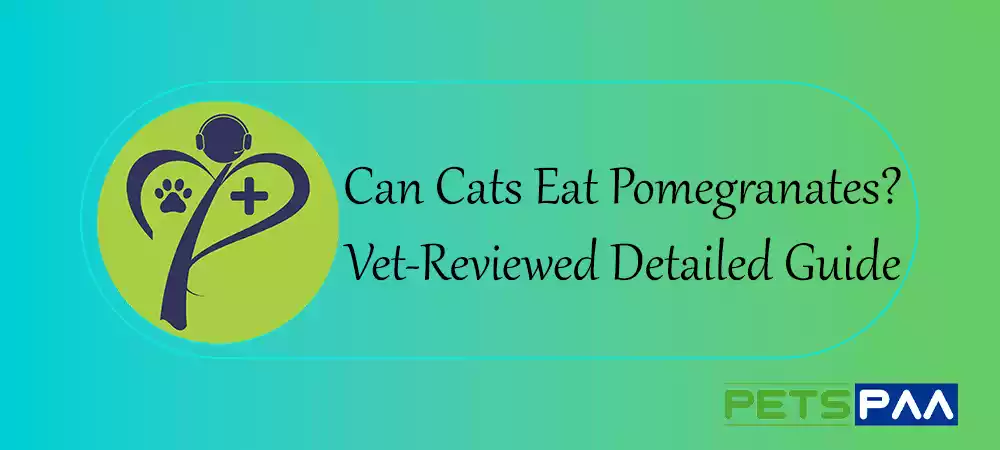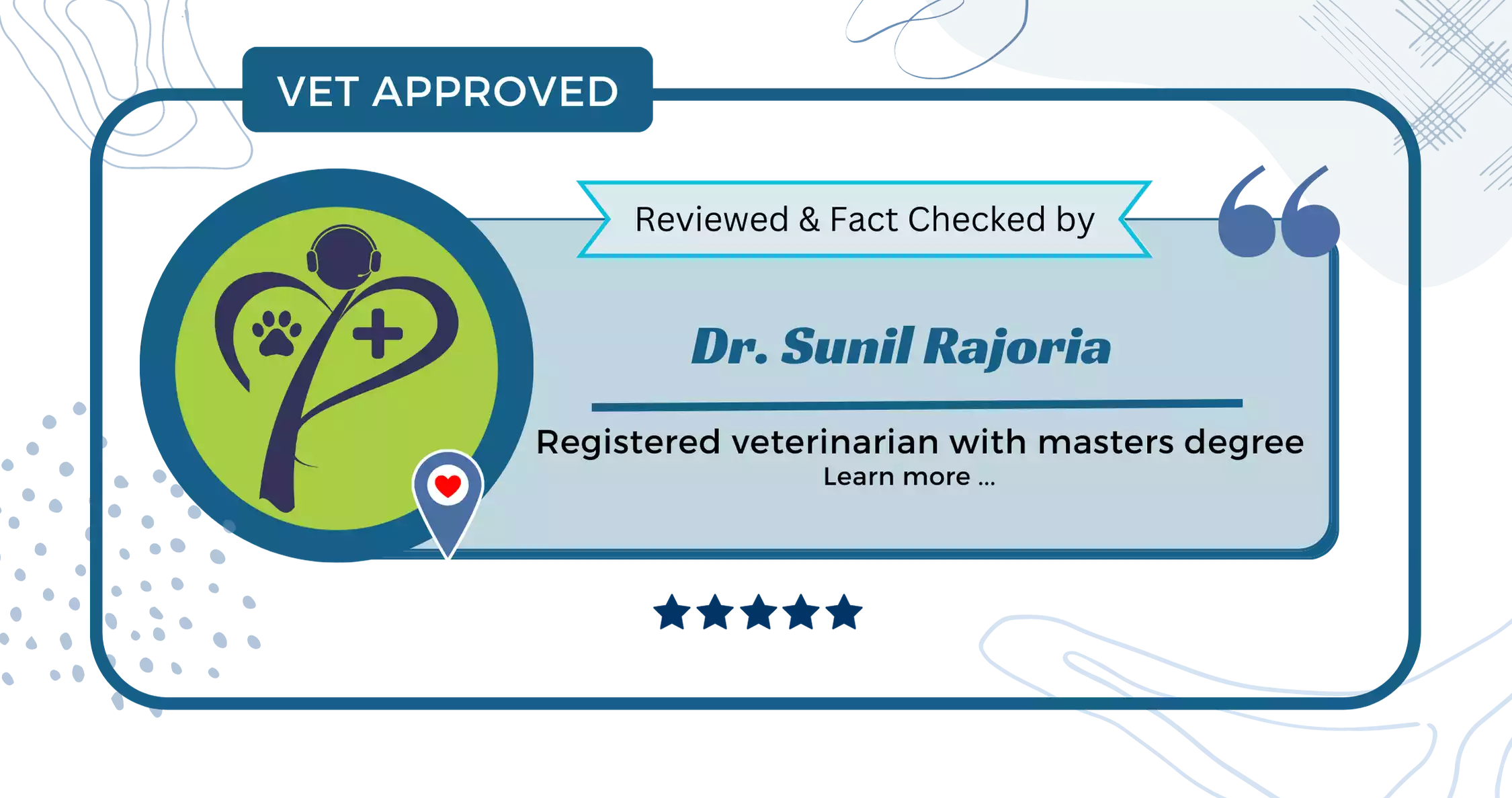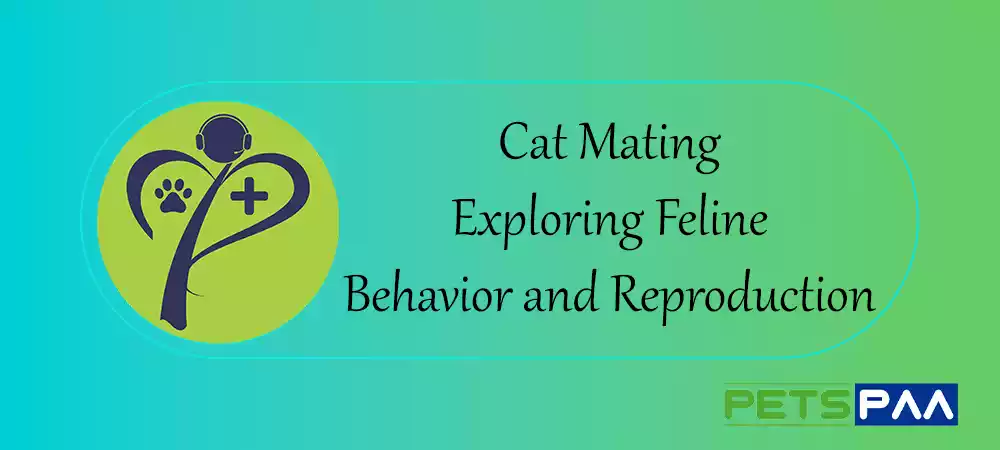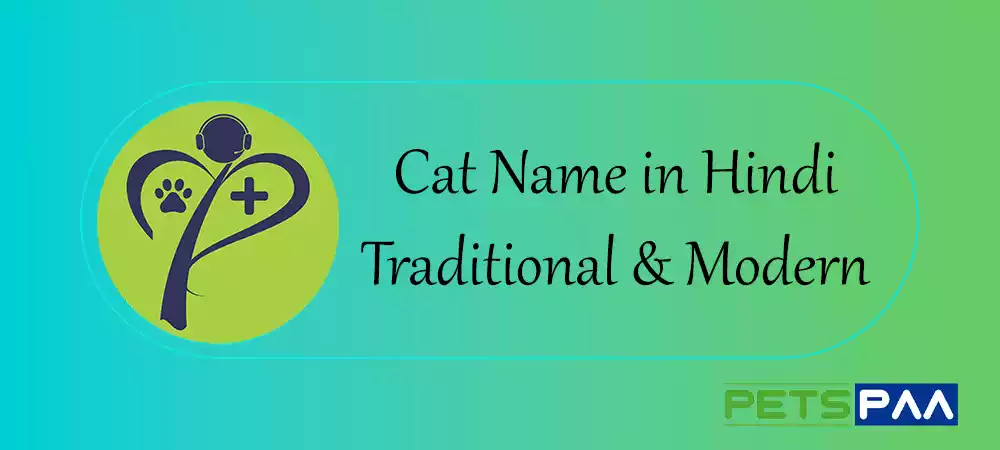Can Cats Eat Pomegranates? Vet-Reviewed Detailed Guide
Pomegranates are widely considered a tasty and nutritious fruit for humans but what about our feline companions? Can cats eat pomegranates?
Looking for “Can cats eat pomegranates?”, the short answer is – YES!! but with some caution.
In this post, we’ll look at cats and pomegranates, looking at the possible advantages, health dangers, and safe methods to enjoy this fruit with our furry friends.
Table of Contents
Section 1: Pomegranate and Cats - The Fundamentals
Pomegranate
The pomegranate fruit belongs to the Lythraceae family which originated from the Middle East, South Asia, and North Africa. It is well known for its bright red color, sweet-tart flavor, and distinct texture.
Pomegranates, which are packed with juicy arils, which are seed-containing sacs, have acquired appeal for their possible health advantages in humans.
Can Cats Eat Pomegranates?
Looking for “Can cats eat pomegranates?”, the short answer is – YES!! but with some caution. While some cats may appreciate the flavor, others may not. It is critical to track their reaction and usage.
Can Cats Eat Pomegranate Seeds?
Do you want to know if can cats eat pomegranate seeds? They certainly can. Pomegranates are rich in vitamins like vit. C, A, and K. Also, because it is high in fiber, it helps maintain cats’ digestive systems and stomachs healthy and may thus be fed to your dog or cat.
Pomegranates include folic acid, which enhances overall health and muscular growth in cats. Pomegranates, including their seeds, are undoubtedly edible to cats. Cats will not be harmed if the seeds are really small but on the other hand, big pomegranate seeds can be a choking hazard in cats.
It is also advisable not to provide pomegranate seeds to cats that have dental problems because the seeds can wreak chaos, causing your pet discomfort while hurting his or her teeth.
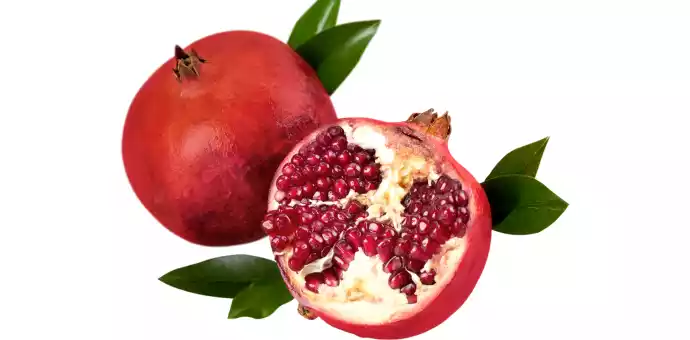
Is Pomegranate Beneficial to Cats?
Pomegranates have many health advantages, but they are not capable to fulfill the dietary requirements of cats alone, that’s why people are worried about “Can cats eat pomegranates?”. It is crucial to note that cats have unique nutritional needs. Their dietary requirements differ from humans and they must eat high-quality protein and fat-rich diets.
Pomegranates include a variety of nutrients including fiber, vitamins, minerals, and antioxidants but regardless they should only be used on rare occasions as treats in moderate quantities.
Feeding cats well-balanced cat food ensures that they get the right nutrients in the right amounts. Pomegranates should be regarded as an infrequent addition to a cat’s diet as long as they do not interfere with their normal balanced meal.
Section 2: Potential Advantages and Risk Factors
Fiber: An Important Pomegranate Component
Pomegranates are high in dietary fiber which helps in digestion and maintaining a healthy GI tract. However, cats have enough fiber from their usual diet, therefore pomegranate should not be used as a replacement.
Fiber is vital for maintaining digestive health in cats. It stimulates regular bowel motions, avoids constipation, and assists digestion in general. Pomegranates include both soluble and insoluble fiber which leads to regular fiber intake.
Rich source of vitamins, minerals, and antioxidants
Pomegranates are high in vitamins, minerals, and antioxidants which facilitate several health advantages. These nutrients are helpful to cats, they may also be acquired through their usual cat food.
Vitamins and minerals are responsible for the overall well-being of cats. Vitamin C stimulates the immune system. Vitamin K is responsible for blood clotting whereas potassium is required for normal heart and muscle function.
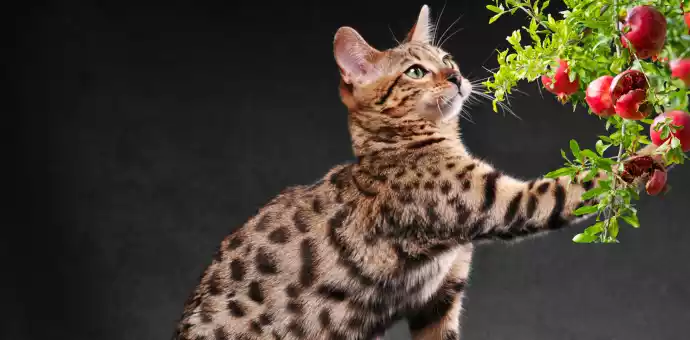
Water: Hydration and Pomegranates
Pomegranates contain a lot of water which keeps cats hydrated. Adequate hydration is critical for the general health of cats. It is crucial to note that cats should largely rely on fresh water for hydration.
Water is necessary for cats to stay hydrated. It regulates body temperature, assists digestion, and supports a variety of biological activities. While pomegranates are high in water but they should not be considered a replacement for the major source of hydration which should be fresh and clean water.
Section 3: Evaluating Health Risks and Drawbacks
Although pomegranates have some health benefits but certain health hazards must also be considered. Cats have distinct dietary needs, and changing their diet might cause imbalances and health problems.
Pomegranate Feeding to Cats May Pose Health Risks
Pomegranate consumption by cats might result in stomach distress, diarrhea, or allergic responses. Each cat is different, and their tolerance to pomegranates varies. Before introducing new foods into your cat’s diet, always speak with a veterinarian.
Food Sensitivities and Allergies
Certain fruits, especially pomegranates, may cause sensitive stomachs or food allergies in some cats. When cats are shifted to new diets, they might develop some digestive difficulties such as vomition or diarrhea.
Pomegranates have natural sugar which may not be well tolerated by many cats, particularly those cats who have underlying health issues like diabetes.
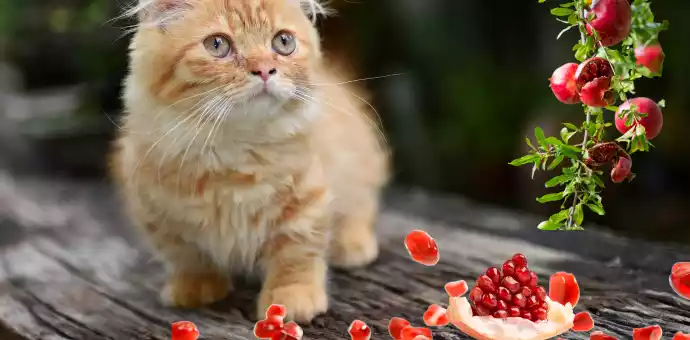
Reactions to Allergens
Allergies might also be a source of concern. Cats, much like people, may acquire food allergies. Itching, skin irritation, gastrointestinal disturbance, or respiratory difficulty are all symptoms of an allergic response.
If your cat exhibits any negative responses after eating pomegranates, it is critical that you quit the diet and seek veterinarian guidance.
Cats and Vitamin C Toxicity
Pomegranates contain vitamin C, which humans require but cats do not. Cats can form vitamin C naturally in their bodies, hence excessive consumption may result in vitamin C toxicity.
This emphasizes the significance of moderation and portion management while feeding pomegranates to your cat.
Pomegranate-Related Gastrointestinal Issues
Pomegranate’s high fiber content might cause gastrointestinal difficulties in cats, such as diarrhea or constipation. It is critical to monitor your cat’s reaction and visit a veterinarian if any stomach issues emerge.
Pomegranate Seeds and Choking Hazard
As previously stated, pomegranate seeds are a choking hazard for cats. Because of their tiny size and firm texture, they might cause choking or blockage in the digestive tract. Before feeding pomegranate to your cat, remove the seeds completely.
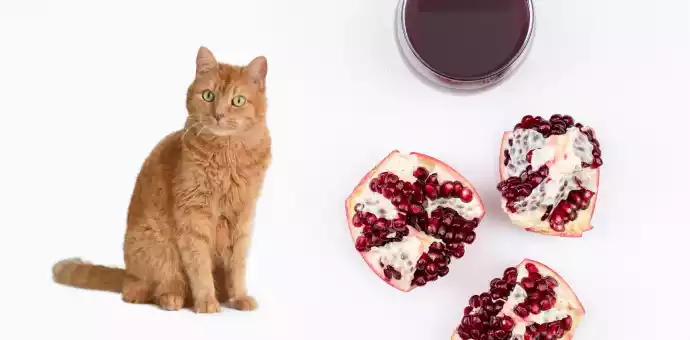
Section 4: Consumption and Sharing in a Safe Environment
How many pomegranates Can Cats Eat?
For cats, little is more when it comes to pomegranates. A modest quantity of pomegranate pulp or juice might be given as a treat on occasion.
To minimize potential health problems, just avoid overindulgence simply. Consider giving your cat a little quantity of pomegranate every day. Too much of the fruit is harmful.
It is preferable if you only offer your cat a small amount of pomegranate several times each day. The pomegranate skin must be removed since it may influence your pet’s digestive tract, producing diarrhea and stomach abnormalities in cats.
You may feed your pet pomegranate juice (not more than two spoons at a time) or add a few tiny pomegranate pieces to their regular diet. You may also add pomegranate-flavored sweets to their meal list.
Pomegranates provide health advantages in cats and can assist boost their health while providing additional vitamins to their bodies.
When Are Pomegranates Harmful to Cats?
Pomegranates are harmful to cats when consumed in large quantities, contain seeds, or when a cat exhibits any symptoms of adverse responses, such as digestive trouble or allergies. Cats have special nutritional requirements, and their general health should always be prioritized.
Excessive pomegranate consumption in cats might disturb their nutritional balance and cause health problems. The presence of seeds might cause choking concerns as well as stomach issues.
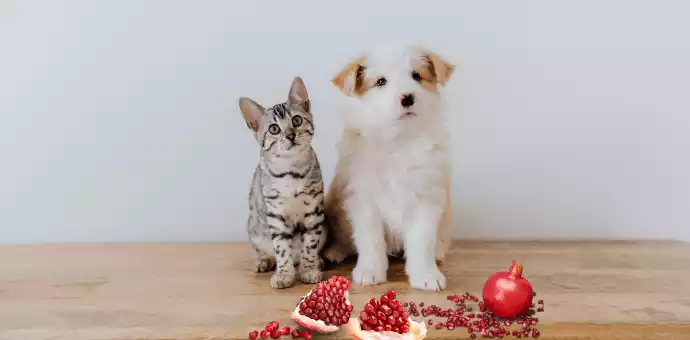
What Are the Best Pomegranate Recipes for Your Cat?
Remove the seeds and just provide a tiny bit of the pulp or juice to your cat to share pomegranates safely. It might be delightful for your feline buddy to mix it with their usual meal or freeze it as a refreshing treat. However, you should constantly observe their response and stop if any problems occur.
Follow these instructions to ensure your cat’s safety and pleasure of pomegranates:
Take out the seeds: Remove the seeds from the pomegranate before offering them to your cat. This eliminates the possible choking threat and digestive issues linked with seeds.
Offer a small amount: Cats have small stomachs and distinct dietary needs, so give them a minimal quantity. Allow a tiny amount of pulp or juice as a treat rather than a big element of their diet.
Mix with regular food: To introduce pomegranates to your cat, combine a tiny bit of the pulp or juice with their usual cat food. This allows them to become used to the taste and texture.
Freeze as a treat: Cats adore ice treats, especially during the warmer months. For a pleasant and occasional treat, freeze a tiny amount of diluted pomegranate juice in ice cube trays.
Remember that every cat is unique, and their reaction to pomegranates may differ. Keep an eye on your cat for any negative reactions and visit a veterinarian if necessary.
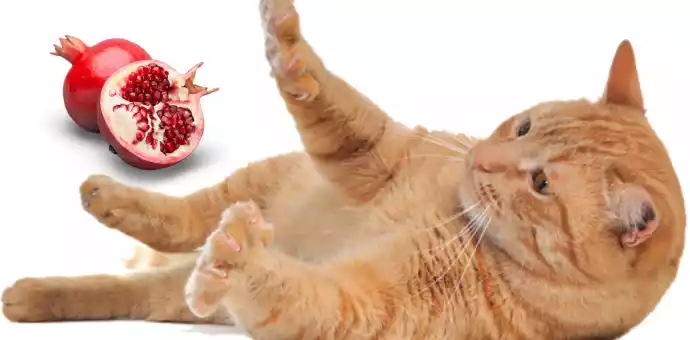
Conclusion
Pomegranates have many potential benefits for humans but it is crucial to proceed with caution when we think about whether can cats eat pomegranates. Cats have special nutritional requirements, and their overall health should be prioritized before feeding any fruit.
Pomegranate seeds can be given to cats as a treat and in moderate quantities. It is crucial to remove the seeds before offering, watch their reaction, and emphasize their usual balanced cat food. Monitor for any indicators of allergies, stomach problems, or choking risks.
PetsPaa, a non-formal group of qualified veterinarians is dedicated to improving pet health. We hope that this article has given you useful information regarding cats and pomegranates.
Helping you to make well-informed decisions about sharing this fruit with your feline friends. Remember that moderation is vital, and your cat’s health and happiness should always take first.
FAQs (Frequently Asked Questions)
Indeed, cats are usually fine to have some pomegranates in moderation. To avoid choking concerns, removing the seeds and any rough components is vital.
While pomegranates are typically healthy for cats and dogs to eat, remember that moderation is vital. Pomegranate can cause stomach distress or diarrhea in pets if fed in large quantities.
Dogs and cats can safely eat pomegranates without any harm.
If your cat mistakenly consumed a small portion of pomegranate, it is improbable that it will result in any severe complications. If your cat consumes a considerable quantity of liquid or exhibits discomfort-related indications, such as vomiting or experiencing diarrhea.
Cats and dogs can safely eat pomegranates without any harm. Don’t overlook the fact that eating large amounts of seeds and rough parts from some foods can be challenging for your digestive system and may result in discomfort.
Digesting pomegranates could pose a problem for animals with fragile digestive systems like rabbits, guinea pigs, and other small rodents.
If you prepare them properly, pomegranate seeds are usually fine for cats and dogs to consume. Still, it’s vital to discard any rough pieces and focus on enjoying the delicious, juicy seeds.
Chewing on pomegranate seeds is not a necessity for cats and dogs, but it helps with their digestion. Chewing aids in the breakdown of seeds and the absorption of nutrients.
If your pet ingests the seeds in their entirety and doesn’t digest them, the seeds may exit their digestive tract without being processed.
As professional veterinarians, Team PetsPaa understands your concerns about the side effects of eating pomegranate seeds. While generally safe, some individuals may experience upset stomachs, allergic reactions, and potential interactions with medications. Consult a healthcare professional or veterinarian for personalized advice.

